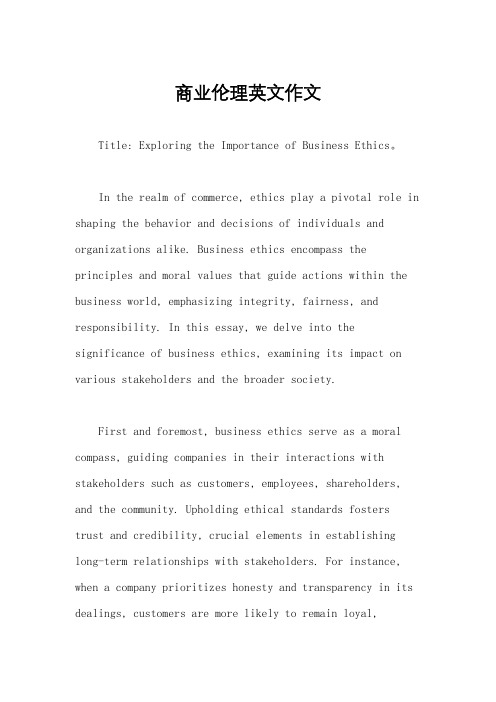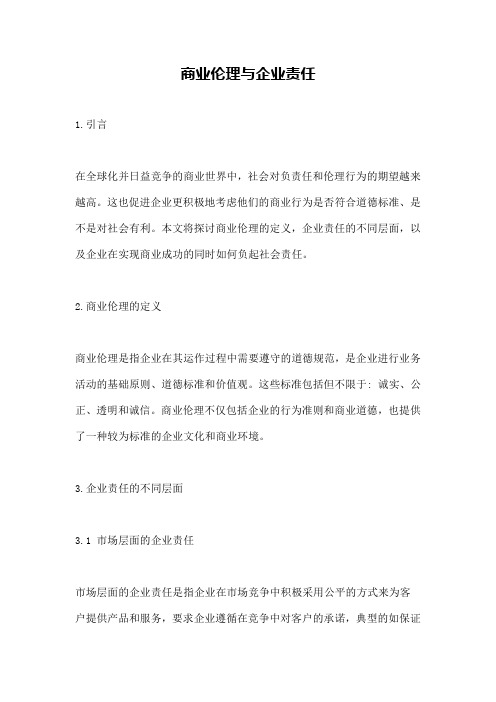Business Ethics and Corporate Social Responsibility
关于企业伦理的文献

企业伦理是关于企业行为和决策中道德原则和价值观的研究领域。
以下是一些关于企业伦理的经典文献和著作,它们提供了对企业伦理问题的深刻洞察和讨论:1. 《商业道德的道德基础》("The Moral Foundations of Business Ethics")by Tom L. Beauchamp and Norman E. Bowie:这本书讨论了商业道德的哲学基础,探讨了企业决策中的伦理原则和问题。
2. 《企业伦理与社会责任》("Business Ethics and Corporate Social Responsibility")by Paul Griseri and Nina Seppala:该书系统地探讨了企业伦理和企业社会责任的关系,介绍了相关理论和实践。
3. 《商业伦理的伦理学》("The Ethics of Business Ethics")by Norman E. Bowie:该书分析了商业伦理的伦理学基础,涉及了商业实践中的道德问题以及企业应对这些问题的策略。
4. 《企业伦理:管理和社会责任的道德挑战》("Business Ethics: Managing Corporate Citizenship and Sustainability in the Age of Globalization")by Andrew Crane and Dirk Matten:这本书深入研究了企业伦理与社会责任的概念,强调了在全球化时代企业所面临的道德挑战。
5. 《商业伦理学》("Business Ethics: A Stakeholder and Issues Management Approach")by Joseph W. Weiss:该书强调了利益相关方理论,并将其应用于商业伦理的实践,考察了在利益相关方视角下的企业决策。
企业与社会责任

企业与社会责任企业社会责任(Corporate Social Responsibility)是当代西方正在兴起的一种企业哲学伦理学,其概念最早由英国提出,通常指与主要利益相关者、价值相联系,遵从法律,并尊重人类、社会和环境的一系列政策和实践。
企业社会责任是与下列三个方面联系在一起的:可持续竞争力;吸引优质的投资者;建立可持续和更加公平的增长机制,这种机制将使包括贫困者在内的社会各阶层受益。
一、企业社会责任提出的背景“企业社会责任”概念最早由西方发达国家提出,近些年来这一思想广为流行,连《财富》和《福布斯》这样的商业杂志在企业排名评比时都加上了“社会责任”标准,可见西方社会对企业社会责任的重视。
联合国也是推动企业发挥社会责任的重要机构。
新一届秘书长安南上台后,联合国的工作重点发生了较大的变化,即从国家主权的维护更多地转向了公民权利的维护.鉴于全球化的脆弱性和国际间越拉越大的差距,鉴于国家内部的差距也在拉大以及财富的分配不公和不平等,特别是鉴于某些企业不合理的发展对世界安全和生态环境带来巨大威胁,安南向国际商界领袖提出了挑战,那就是呼吁企业约束自己自私的牟利行为,并担负起更多的社会责任。
1999年1月,在瑞士达沃斯世界经济论坛上,联合国秘书长安南提出了“全球协议”,并于2000年7月在联合国总部正式启动。
该协议号召公司遵守在人权、劳工标准和环境方面的九项基本原则,其内容是:1,企业应支持并尊重国际公认的各项人权,2,绝不参与任何漠视和践踏人权的行为,3,企业应支持结社自由,承认劳资双方就工资等问题谈判的权力,4,消除各种形式的强制性劳动,5,有效禁止童工,6,杜绝任何在用工和行业方面的歧视行为,7,企业应对环境挑战未雨绸缪,8,主动增加对环保所承担的责任,9,鼓励无害环境科技的发展与推广。
分析这九项原则,从企业内部看,就是要保障员工的尊严和福利待遇,从外部看,就是要发挥企业在社会环境中的良好作用。
总起来说,企业的社会责任可分为经济责任、文化责任、教育责任、环境责任等几方面。
Business Ethics and Social Responsibility

2
There is little evidence that ethical behavior increases profits or that unethical behavior decreases profits… so why bother?
Society as a whole benefits by encouraging economic competition; no one wants to compete with unfair competitors. People feel better when they behave ethically. Unethical behavior can be costly, if there is public outrage leading to a boycott.
Essentials of Business Law -- 4th Edition
© 2010 Cengage Learning. All Rights Reserved. May not be copied, scanned, or duplicated, in whole or in part, except for use as permitted in a license distributed with a certain product or service or otherwise on a password-protected website for classroom use.
2
What are the facts? What are the critical issues? Who are the stakeholders? What are the alternatives? What are the implications of each choice?
Business Ethics & Social Responsiblity

2. Government regulations
大学城清洁公司
好又多(沃尔玛) 超市
/2014091 8/n404415848.shtml
Do some research on the above companies or any others and reading on your textbook, 1. Describe their recent conduct of unethical behaviors to employees (p37-39) 2. How should the companies or others ensure responsiblity toward employees (p39-42)
Income
Responsibility to Employees
dividends
Products and services
Can government or others do anything?
Can companies do anything?
Responsibility to Employees
Test: Who is a Murderer?
Dimensions of Diversity
Secondary Dimensions Primary Dimensions Marital Status Age Gender Physical Ability Race Ethnicity Sexual Orientation Religious Beliefs
From 2001-2010, Managers of Enron(安然), Lehman Brothers(雷曼兄弟) and Pfizer(辉瑞)were announced to steal a huge of amount of profits from their investors in order to serve their best interest. Do you know the result of the above situation? - Stockholders (investers) have sufferred great loss and some of them had to go bankruptcy in order to pay it off. And can you imagine if they were state-owned companies, what would be the result?
商业伦理英文作文

商业伦理英文作文Title: Exploring the Importance of Business Ethics。
In the realm of commerce, ethics play a pivotal role in shaping the behavior and decisions of individuals and organizations alike. Business ethics encompass the principles and moral values that guide actions within the business world, emphasizing integrity, fairness, and responsibility. In this essay, we delve into the significance of business ethics, examining its impact on various stakeholders and the broader society.First and foremost, business ethics serve as a moral compass, guiding companies in their interactions with stakeholders such as customers, employees, shareholders, and the community. Upholding ethical standards fosterstrust and credibility, crucial elements in establishing long-term relationships with stakeholders. For instance, when a company prioritizes honesty and transparency in its dealings, customers are more likely to remain loyal,knowing that their interests are valued and protected.Moreover, ethical conduct contributes to a positive corporate culture, promoting mutual respect and dignity among employees. A workplace that prioritizes fairness and equality not only enhances employee morale but alsoattracts top talent. When individuals feel valued and respected, they are more motivated to contribute their best efforts towards organizational goals, leading to increased productivity and innovation.From a broader perspective, adherence to ethical principles fosters sustainable business practices that benefit both the environment and society. Companies that prioritize environmental stewardship and social responsibility not only minimize their ecological footprint but also contribute to the well-being of communities. By investing in initiatives such as renewable energy, waste reduction, and community development, businesses can create shared value, aligning financial success with societal progress.Furthermore, ethical behavior mitigates risks and safeguards corporate reputation. In an era of heightened transparency and accountability, any deviation from ethical standards can lead to severe repercussions, including legal consequences and reputational damage. By proactively addressing ethical dilemmas and adhering to established codes of conduct, companies can mitigate risks and protect their brand integrity in the long run.Nevertheless, navigating ethical challenges in the business world is not always straightforward. In today's complex and interconnected global economy, companies often face competing interests and conflicting values, requiring careful deliberation and ethical judgment. Balancing financial objectives with ethical considerations can be particularly challenging, especially in highly competitive industries where profit margins are tight.Moreover, cultural differences and varying legal frameworks further complicate ethical decision-making, highlighting the importance of cross-cultural understanding and ethical leadership. While certain practices may beacceptable in one cultural context, they may be deemed unethical or even illegal in another. Thus, fostering a culture of ethical awareness and accountability isessential for navigating the intricacies of a globalized marketplace.In conclusion, business ethics serve as the foundation for responsible and sustainable business practices, shaping the conduct of individuals and organizations in the pursuit of economic prosperity. By upholding ethical standards, companies can build trust, foster innovation, and create value for all stakeholders. As we navigate the complexities of the modern business landscape, let us remain steadfast in our commitment to ethical integrity, recognizing that true success is not merely measured in financial terms but in the positive impact we make on society and the world at large.。
企业道德和社会责任 Business Ethics and Social Responsibilit

What Business Areas Does CSR Cover
• Ethics - discretionary actions. • Moral righteousness.
• Strategic brand management - Brand building, Brand insurance.’
Corporate social responsibility (CSR) is concerned with the ways in which an organisation exceeds its minimum obligations to stakeholders specified through regulation
• This poses a challenge as there are many different stakeholders with different, perhaps conflicting, expectations.
• Managers will need to take a view on: i. Which stakeholders have the greatest
development in LDCs. • Importance of global brands and corporate
reputations.
11
Key Drivers in CSR
• Changing social expectations - Consumers and society in general expect more from the companies whose products they buy. This sense has increased in the light of recent corporate scandals, which reduced public trust of corporations, and reduced public confidence in the ability of regulatory bodies and organisations to control corporate excess.
国际商务 企业社会责任CSR

•
School of International Business-SWUFE
Education
•
Formal education – The medium through which individuals learn many of the language, conceptual, and mathematical skills. – Supplements the family’s role in socialising the young into the values and norms of a society. – Teaches basic facts about the social and political nature of a society.
School of International Business-SWUFE
Enhancing your intercultural sensitivity -- THE CONCEPT OF CULTURE
Symbols Attitudes
Shared System
Values
Priorities Attitudes Rules
School of International Business-SWUFE
Exporting Jobs or Abusing People?
• •
Nestle-Powdered Milk Issue Nike (low wages, child labor and unsafe working conditions)
School of International Business-SWUFE
Ethics/CSR
商业伦理与企业责任

商业伦理与企业责任1.引言在全球化并日益竞争的商业世界中,社会对负责任和伦理行为的期望越来越高。
这也促进企业更积极地考虑他们的商业行为是否符合道德标准、是不是对社会有利。
本文将探讨商业伦理的定义,企业责任的不同层面,以及企业在实现商业成功的同时如何负起社会责任。
2.商业伦理的定义商业伦理是指企业在其运作过程中需要遵守的道德规范,是企业进行业务活动的基础原则、道德标准和价值观。
这些标准包括但不限于: 诚实、公正、透明和诚信。
商业伦理不仅包括企业的行为准则和商业道德,也提供了一种较为标准的企业文化和商业环境。
3.企业责任的不同层面3.1 市场层面的企业责任市场层面的企业责任是指企业在市场竞争中积极采用公平的方式来为客户提供产品和服务,要求企业遵循在竞争中对客户的承诺,典型的如保证公正的定价、保证产品的质量和保护知识产权。
3.2 社会层面的企业责任社会层面的企业责任是指企业需要充分考虑社会影响,积极回馈社区并适当减少企业在社交问题中的负面影响。
这包括但不限于环境保护、能源管理、捐款和慈善活动、保护人权和女性和儿童权利等。
3.3 法律层面的企业责任法律层面的企业责任是指企业应遵守来自各种规定,也必须遵守各国的劳动标准、环境标准和其他相关法律法规。
这包括但不限于反腐败、财务透明度和人权等。
4.企业如何负责任企业不仅应该恪守商业伦理和守责任原则,而且应该采取行动来满足这些原则。
下面是企业负责任的一些举措:4.1 诚实透明度企业在经营过程中应始终保持透明和诚实,而不应做出虚假的声明或变相欺骗顾客和员工。
企业应公开宣布其重要决策、业务活动和管理程序。
同时,企业应遵守所有适用的法律法规和合规程序。
4.2 保障客户利益企业在提供产品和服务时,需要保障消费者的利益。
企业需要客观的对待客户要求,对账目、价格、产品质量等方面进行认真审核,并及时处理客户的投诉以保证客户的信任。
4.3 关注社会发展企业应该不断关注并回馈社区,例如参与环保志愿者行动,开展慈善活动等。
- 1、下载文档前请自行甄别文档内容的完整性,平台不提供额外的编辑、内容补充、找答案等附加服务。
- 2、"仅部分预览"的文档,不可在线预览部分如存在完整性等问题,可反馈申请退款(可完整预览的文档不适用该条件!)。
- 3、如文档侵犯您的权益,请联系客服反馈,我们会尽快为您处理(人工客服工作时间:9:00-18:30)。
LO 1
Ethics, Corporate Social Responsibility, and Corporate Sustainability (Cont.) Corporate sustainability focuses on the possible future impact of an organization on society, including social welfare, the economy, and the environment
2-6
LO 3
Sources of Ethical Guidance
Lead to our beliefs or convictions about what is right or wrong
Examples:
Bible and other holy books Conscience Significant others Code of ethics
2-5
LO 2
Explore the Concept of Business Ethics
Nearly every industry has experienced a painful ethical crisis in recent years Business ethics scandals continue to make headlines Examples: Lying on résumés Obstruction of justice Destruction of records Stock price manipulation Cutting corners to meet Wall Street’s expectations Fraud, waste, and abuse
Learning Objectives (Cont.)
7. Discuss the importance of linking pay to ethical behavior. 8. Describe ethics training. 9. Describe the concept of corporate social responsibility. 10.Explain corporate sustainability. 11.Describe a social audit. 12.Explain whether corporate social responsibility can succeed in the global environment.
Business Ethics and Corporate Social Responsibility
Learning Objectives
1. Define ethics, corporate social responsibility, and corporate sustainability. 2. Explore the concept of business ethics. 3. Describe sources of ethical guidance. 4. Discuss attempts at legislating ethics. 5. Explain the importance of creating an ethical culture and code of ethics. 6. Define human resource ethics.
Dodd-Frank Wall Street Reform and Consumer Protection Act
2-8
LO 4
Procurement Integrity Act of 1988
Prohibits release of source selection and contractor bid or proposal information
2-7
LO 4
Legislating Ethics
Procurement Integrity Act
Federal Sentencing Guidelines for Organizations (FSGO) Corporate and Auditing Accountability, Responsibility, and Transparence Act
Outlined effective ethics training program
Promቤተ መጻሕፍቲ ባይዱsed softer punishments for wayward corporations that had ethics programs in place Executives needed to be proactive Created:
LO 1
Ethics, Corporate Social Responsibility, and Corporate Sustainability
Ethics: Discipline of dealing with: What is good and bad
What is right and wrong Moral duty and obligation Corporate social responsibility (CSR): The implied, enforced, or felt obligation of managers, acting in their official capacity, to serve or protect the interests of groups other than themselves
Places restrictions on former employees Passed after reports of military contracts for:
$500 toilet seats
$5,000 hammer
2-9
LO 4
Federal Sentencing Guidelines for Organizations (FSGO) of 1992
